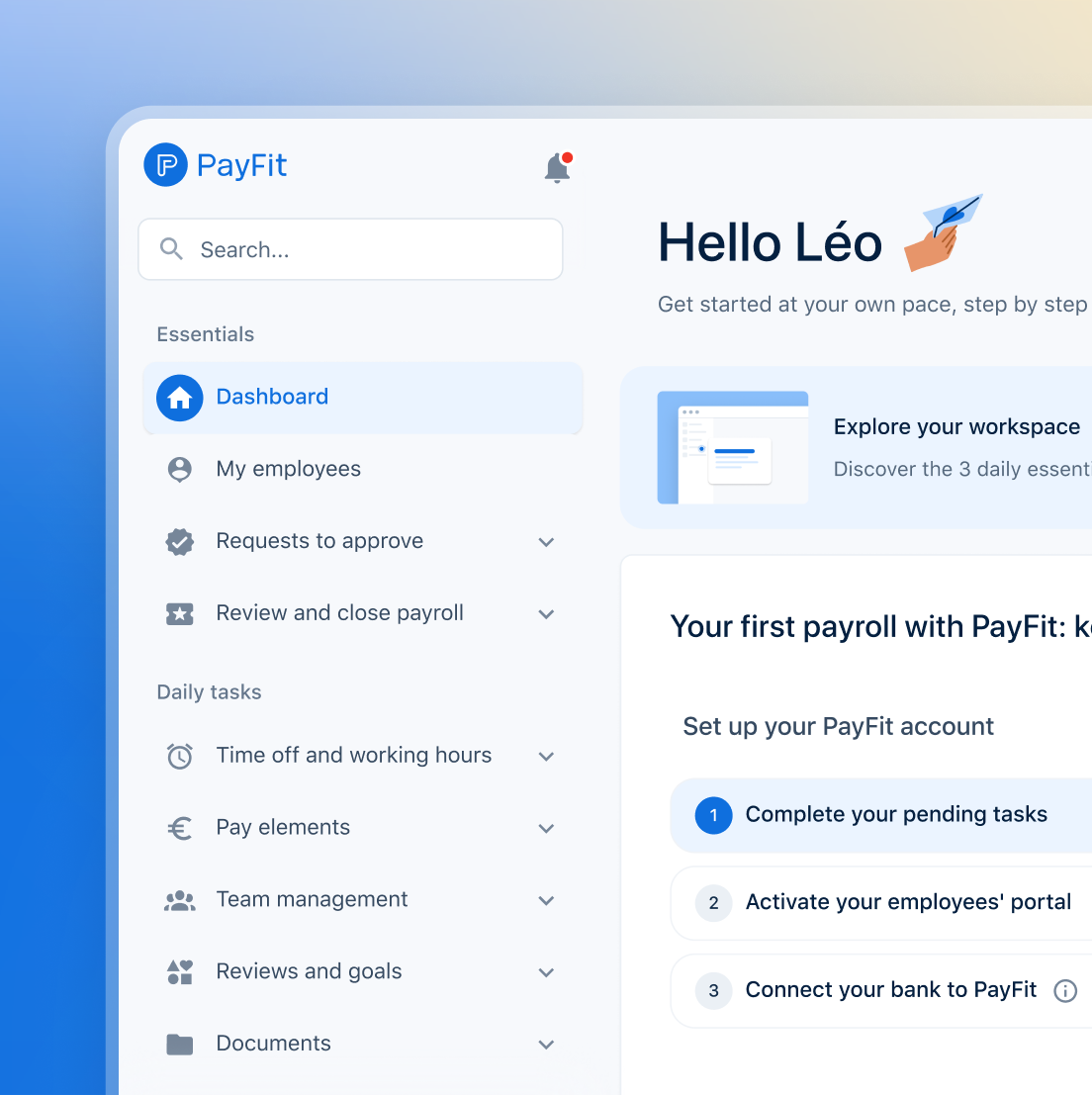✨ Health insurance, now in PayFit - learn more
💷 All the rates & thresholds you need to know for 25/26...right here
✨ The Payroll Journey: Start, Scale & Succeed Globally - learn more
✨ Health insurance, now in PayFit - learn more
💷 All the rates & thresholds you need to know for 25/26...right here
✨ The Payroll Journey: Start, Scale & Succeed Globally - learn more

For most workers who’ve gotten a taste of flexible hours, there’s no going back.
The benefits of working flexibly - including the freedom, autonomy and control reclaimed over their lifestyles - far outweigh the costs. But what does this new workplace trend ultimately mean for the future of UK businesses, and what are some of the more concrete gains to be made?
Let’s revisit some of the core advantages flexible working can provide, both for UK employers and their employees, starting with one of the biggest questions on people’s minds…
A chief concern that many detractors of flexible working have is that giving people time and space to craft their own working schedules puts productivity at risk.
For some organisations, the idea that presentism equates to productivity still persists. But as more and more people experience the true benefits of flexible working this narrative is being flipped on its head.
As we’ll explore a little later, one of the major benefits of offering flexible working hours is that they can actually unlock greater levels of productivity and efficiency by freeing up more time for employees during the workday and reducing stress levels.
This isn’t just something that employees and companies have come to appreciate; in publishing its new set of flexible working laws, the UK government has taken a bold stance on crafting and supporting more people-centric legislation.
Where autonomy grows, motivation thrives. And the empowerment that comes from structuring the work week in a way that suits individual lifestyles supports this.
Flexible practices demonstrate to your employees that you trust and respect them. In turn, this translates into highly motivated workers who are committed to achieving your company’s goals. That makes flexibility in itself a powerful tool for engagement and retention.
As we’ve just touched on, the link between flexible working practices and staff morale is undeniable. The ability to balance professional responsibilities with personal commitments, such as childcare or hobbies, can significantly reduce stress and burnout. When employees feel supported in achieving a healthy work-life balance, it cultivates a positive workplace culture, enhancing job satisfaction and loyalty.
Now that we’re more familiar with how flexibility relates to concepts like productivity, well-being, and engagement, let’s hone in on some of the core advantages of working flexibly from both the employer and employee perspectives.
For companies, there are both direct and indirect benefits to offering different types of flexible working arrangements.
Reducing office space costs and matching resources with demand levels are two more tangible positives. But there are also gains to be made in the form of higher productivity, retention and resilience. Here are the benefits of flexible working for employers.
Let’s drive to the heart of what organisations really want. Recently, productivity and efficiency have featured heavily in boardroom discussions across the UK. The great news? Flexibility can help bolster both.
In fact, one of the most positive benefits of flexible work is the surge in productivity and efficiency that can result. Whether it’s swapping the commute for ‘deep work’ sessions in the morning or afternoon or allowing employees to work from a location where they feel more comfortable and energised, you’ll be harnessing all of this ‘peak performance’ potential, as Sophie, Head of People at Floww points out:

Liberated from the shackles of a rigid schedule, employees can work when their focus, creativity, and energy are at their highest. Time spent commuting or squeezing personal commitments around work gets redirected, which leads to bigger and better output for your team and overall business.
Another upside to offering flexibility is the impact it can have on your retention and recruitment strategies. It’s no secret that flexibility has rocketed to the top of every job hunter’s wish list. It’s an employee benefit people have increasingly come to value in order to fit their work around their lives (and not the other way around).
This makes flexibility the perk of choice for the majority of candidates entering the modern job market and a key differentiator you can use to attract top talent. But as our CPO Marie Alice Tantardini shares, it shouldn’t just be used as a tactical tool.

Which leads us perfectly to our next point.
As we covered at length in our whitepaper on the topic, flexible working practices encourage a culture of trust and autonomy. In turn, this fosters a more resilient and adaptable workforce.
If employees are encouraged to take ownership of their time, they’re more likely to take on new challenges with this same initiative and adaptability. In rapidly changing industries, where the ability to pivot is the aim of the game, this resilience can be golden.

Build the right HR tech stack
For employees, the sense of fulfilment, opportunities and work-life balance flexibility provides can be game-changing. From the employee vantage point, flexible working arrangements are…
When employees are unhealthy, tired and straining under stress, their work is directly impacted. But when you offer personnel the freedom to choose when, where and how they want to work, both productivity and personal fulfilment can soar.
That makes flexible working a key component of any healthy work-life balance, whether that includes fitting in personal responsibilities like childcare or time for hobbies or to recharge.
In addition to this, another key advantage of flexible working is that it supports better job satisfaction and morale. Instead of simply clocking in every day to collect a paycheck, employees show up fired up and engaged to take on the day.
This is because they feel valued and respected when their personal needs and preferences are being met. And that inevitably leads to a more positive work environment and culture.
Finally, flexible working can open up new career pathways and doors for your people. By freeing up time employees would otherwise spend commuting or adhering to a strict schedule, you’re helping employees to pursue outside interests, which can include further education and training.
All of this means that they may pick up new skills and aptitudes that could translate directly into career progression and additional value for your organisation.
Of course, this wouldn’t be a discussion about flexibility without addressing the potential drawbacks…
Nothing in life is perfect, and that goes for flexible work arrangements, too. While there are countless benefits to allowing your entire workforce to set their own working schedule, there are also disadvantages to be aware of, and it’s important for HR leaders to acknowledge this.
For one, it’s much easier for employees to become distracted, especially if they are working from home a lot. Communication can also break down if you don’t have strong channels and processes in place. That sense of team cohesion may also erode when face-to-face interactions become less frequent.
As we discovered in our recent survey, managing a flexible workforce requires robust policies and clear expectations. Of the employees we surveyed, 34% said they needed clearer guidelines to fully take advantage of their flexible working policy.

Implementing successful flexible working practices requires a strategic approach. Clear communication, the right technological tools, and an emphasis on results rather than hours worked are key. Employers should consider regular check-ins and team meetings to maintain connection and cohesion among remote or flexibly working employees.
Increased productivity and a boost in performance
A strong part of the talent retention strategy
A more resilient and adaptable workforce
The key to a healthier work/life balance
Increased job satisfaction and morale
A way of supporting personal and professional growth
The movement towards flexible working practices represents a significant shift in the traditional working model.
But it’s also a concrete ‘win-win’ scenario for both the employers and employees involved.
By embracing the benefits of flexible working hours and addressing its challenges head-on, HR leaders can foster a more motivated, productive, and satisfied workforce.


Learn what an employee performance evaluation is, what to include, how to run effective reviews, and how to turn feedback into real improvement.

Corporate wellbeing programmes can support employee health, reduce stress and improve engagement. Learn what to include, how to launch, and which initiatives work best.

2026 strategic guide for UK finance and HR leaders on running effective employment engagement surveys, with top questions, methods & software solutions.

Employee performance management tools streamline reviews, goal tracking and feedback. Discover features, benefits and top UK options for small businesses.

Read our guide to performance appraisals, from their definition and purpose through to best practices and available tools for UK companies.

Employee Assistance Programmes can be a valuable tool for HR leaders to provide support and advice for employees. Find out about them here.

See what's new in PayFit
New features to save you time and give you back control. Watch now to see what's possible